The job of a nurse doesn’t follow the schedule of other professionals. People don’t stop getting sick just because it’s summer — if anything the opposite, with Covid-19 numbers rising again. No long summer break for us! That sucks — but we can still use this season to stop and look at where we are … and if we can do better. Because with more and more employers reaching for the sign-on bonuses, there’s good reason to believe you could!
When nurses have had enough
Be honest: are you happy with your current job? After everything that has happened, employees across industries are asking themselves this question and replying with a hard “No”. In fact, across the economy “Americans are quitting their jobs at record rates as employers poach workers with raises, bonuses and perks.”
That goes for nurses too, and who can blame us, after grappling with PPE shortages, soaring understaffing and Covid deniers for so long? We probably won’t make as colorful a statement as the Burger King workers in Nebraska who changed the sign outside to say “We all quit”, but in nursing too, people are on the move — changing jobs, specialties, or even leaving nursing altogether.
A Washington Post/KFF poll found that 29% of health care workers have considered leaving the profession. Another survey found that almost half of nurses, especially younger nurses, are less committed to the profession than before the pandemic.
It has gotten to the point where experts estimate “that last year marked the largest retirement of nurses ever recorded in the U.S.,” and an additional 500,000 nursing retirements are likely by 2022. That would “leave the country with a nursing shortage totaling an estimated 1.1 million.”
Nurse employers respond by supersizing the bonuses
In response, employers are reaching to ever flashier deals to lure in new nurses, providing lucrative opportunities for those determined to stay in the profession.
Penn State Health started “offering $15,000 sign-on bonuses for hundreds of nurses” as well as paid time off and shift differentials, HealthcareDive reported, and the Baptist Health system in Texas offered “up to $20,000 bonuses for new nurses” in June.
The trend is systematic, the industry journal reported — and there’s plenty of anecdotal examples on Twitter too. On one nurse staffing platform, the share of health systems offering sign-on bonuses increased from 30% at the start of the pandemic to 47% now, and the average sign-on bonus went from $8,200 to $9,190.
That’s on top of wages that had already been increasing, HealthcareDive added. The median pay for a registered nurse was over $75,330 a year In 2020, up from $71,730 in 2018.
During the pandemic, healthcare employers came to rely more and more on travel nurses, creating a surge in demand that yielded a windfall in rising salaries for nurses willing to go that route. But as the gap with regular wages grew, it created a feedback loop where more and more nurses ditched their staff position to opt for more lucrative travel jobs. Who can blame them?
Employers are now understandably eager to hit reverse, and persuade travel nurses to sign on for permanent positions. Piedmont Healthcare in Georgia told Healthcare Dive they are offering sign-on bonuses of up to a whopping $30,000 to nurses who commit to staying for two years.
Your leverage has increased — why not see what it might bring you?
Their eagerness provides nurses like you with a strategic advantage in seeking the kind of position and benefits you want. Speaking of the economy at large, the New York Times went as far as saying that “the relationship between American businesses and their employees is undergoing a profound shift: For the first time in a generation, workers are gaining the upper hand”.
Nurse shortages of course “are a long-standing issue,” as ANA President Ernest Grant told ABC News. But with significant numbers of nurses retiring because their health or family situation meant they couldn’t risk pandemic care — or simply because it all became too much — “it is anticipated to grow even more by next year”. The pandemic “caused a perfect storm” for employers, added Jaime Caldwell, president of the South Florida Hospital and Healthcare Association.
To be brutally honest: your leverage to find better pay and working conditions increases right in pace with that resurgent nurse shortage. It was you, not management, who took on the risks and shouldered the burdens. Now that the consequences give you a strategic advantage, why not check out what that might get you?
Take stock of what you are enjoying and what you are missing in your current workplace. Make a list of pros and cons. Then register on our website or update your profile, and browse the job opportunities we identify for you to see how they compare. Hit the inquire button to find out more if you need; don’t hesitate to ask questions!
Fair warning: not all nursing positions are alike
We’re not going to lie: some specialties are in significantly higher demand than others, of course. Nurses with experience in ICUs and medical surgical units are especially sought after, Incredible Health CEO Iman Abuzeid said, and OR nurses are “needed as systems look to recoup lost revenues after elective care delays”.
Demand for OR nurses is expected to further increase later this year, The Gypsy Nurse suggests, also noting high demand for TELE and ER nurses. There is the longer term to consider too. Job prospects for Nurse Practitioners look particularly good, with the number of NP jobs set to grow 45% in a decade.
Not everyone is able to apply for the jobs that get the extra pay and bonuses, however. They might not be in the right specialty, or have families and lives that keep them from moving to the places where rewards are highest. Or they might be unwilling to take on the pressures that come with the best-paid stints, like in Covid-care.
The waterbed effect: bonuses create greater demand elsewhere too
There are secondary effects, though, creating additional openings elsewhere. Nursing homes and home health in particular have been bleeding nurses as “the surging demand for personnel at hospitals, testing sites and vaccination centers drew nurses away with as much as double the wages”.
31-year-old nurse Jarred Rhatigan, for example, told the New York Times he dropped his $40/hour home care shifts to administer vaccines for up to $75 an hour. Again — no judgement; home care work should obviously be paid better. But it has left employers and patients crying out for nurses willing to take on these jobs.
“As recently as two years ago, we could easily interview 20 people a week who were qualified — now we’re lucky to get two to four,” the Times quoted Robert Pacella of Caring Hands Home Care. Thrive Skilled Pediatric Care said its operation “received 53 percent fewer job applicants in March compared with the same month last year.” And a survey from the AHCA/NCAL “found 94% of nursing home providers had a shortage of staff members in the last month — and more than half lost key members of their staff during the pandemic,” CNN reported.
Many of these jobs don’t offer the sign-on perks of ICU or ER nursing. But if you have been struggling to get a foot in the door, or you are simply distressed about the many patients in these sectors who are now not getting the care they need, these secondary effects matter create new openings.
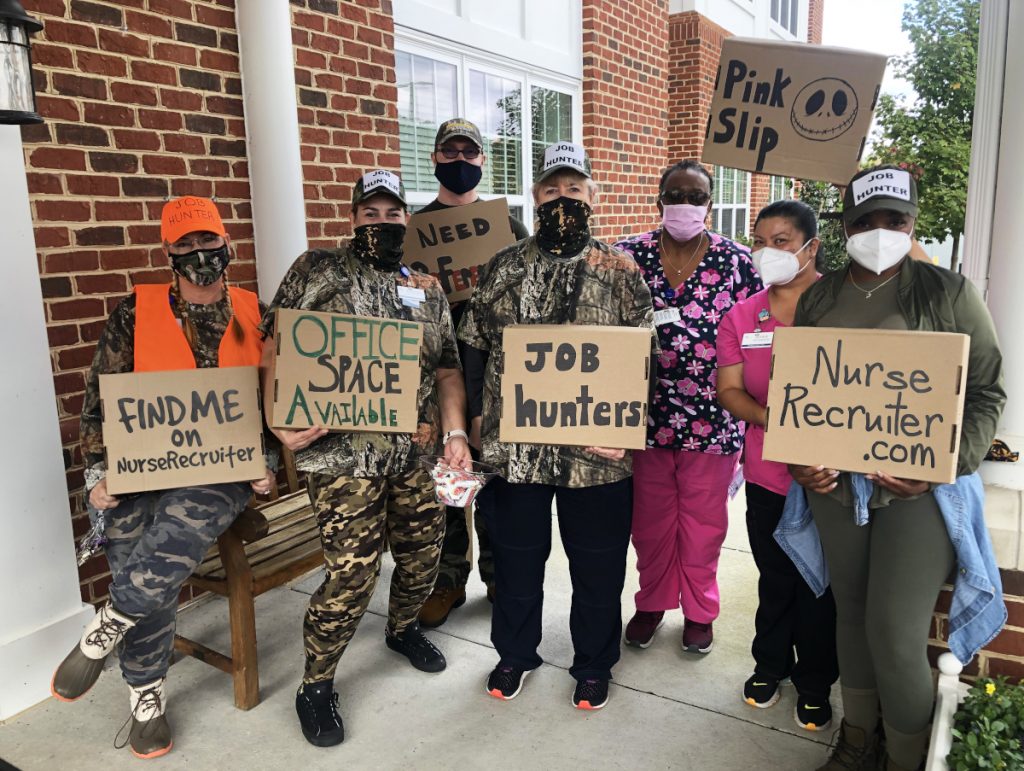
Beyond bonuses: when it’s not all about the money
Meanwhile, the employers who find themselves so hard-up now they’re offering crazy bonuses should be asking themselves whether they’ve really understood what has happened, these past two years. After all, pay was only a small element in why so many nurses retired early, left the profession, or took a break.
“Some have realized pandemic care isn’t the type of care they wanted to deliver, while others have left because they didn’t feel adequately supported by their organizations,” Dr. Anne Dabrow Woods, DNP, RN, told Gabrielle Masson at Becker’s Hospital Review. “What many health workers went through this past year was traumatic,” Jaime Caldwell pointed out. “They are stressed out and tired.”
That means employers should also “start looking at personally tailored health care support for nurses, especially the ones that might be suffering from PTSD”. One recent poll found that “one in five healthcare workers feel that they needed mental health services but haven’t been able to get them.”
“On paper, monetary bonuses look great,” Masson warns. But “if systems have a reputation that they don’t support nurse well-being, people aren’t going to come. Or the people who do come aren’t the nurses organizations want”. Plus, we’d add: imagine how all those bonuses for new hires make your existing staff feel if there is no corresponding investment in them, after all they’ve gone through!
Instead, Dr. Woods continued, health systems “need to provide a safe environment with adequate staffing” and “offer programs that promote autonomy so nurses can practice their full autonomy,” flexible staffing hours, and easier access to adequate sick leave policies and employee assistance programs. In short, workforce well-being should be as much of a focus as patient well-being.
Prioritize self-care in your job hunt too
As a nursing job board we can’t force employers to follow our advice, but of course we hope they are listening! In the meantime, these considerations should be front of mind for you too when you browse new job postings (preferably on our site) and inquire for more info.
The bonuses, differentials and relocation assistance dollar numbers will grab your attention, but do the postings mention anything about career advancement prospects, training or professional development? Maybe even — dare one say — their patients to nurse ratio? Perhaps check out what the facility’s Leapfrog Hospital Safety Grade is as well: if it’s not a safe place for patients that doesn’t bode well for nurses either.
There’s even something to be said for being wary of the highest sign-on bonus $ numbers. Not because the money isn’t tempting! But the more they’re offering, the harder up they must be, and it might be worth probing a little why that is. Do they need a lot of new nurses because they’re expanding? Great! Are they desperate because especially difficult working conditions have created a revolving-door workfloor? Not so great.
Even when job hunting, self-care comes first. Does the employer show signs of “getting it”? If you find that your experience in these past two years provides you with some much-earned new leverage, use it wherever possible to improve your mental as well as your financial well-being.

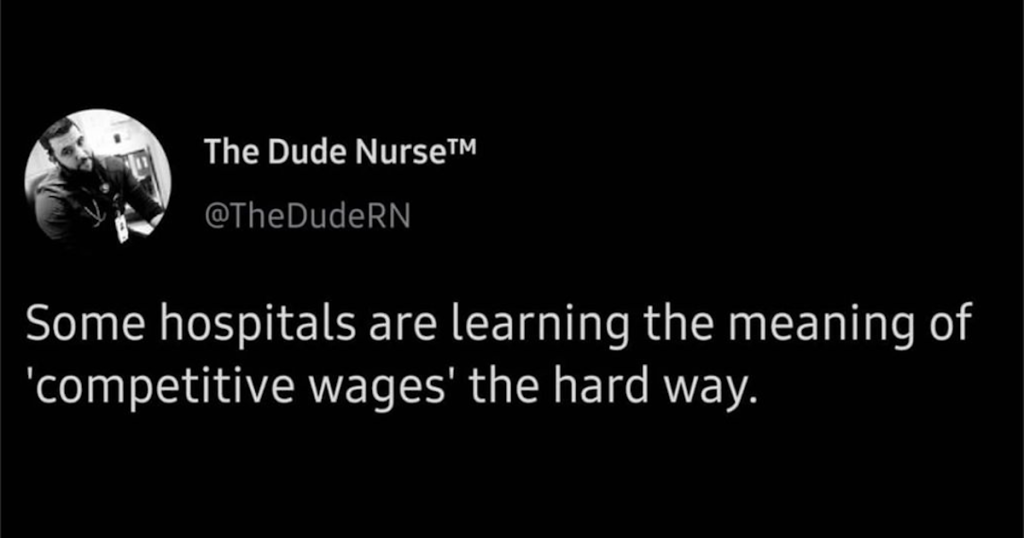
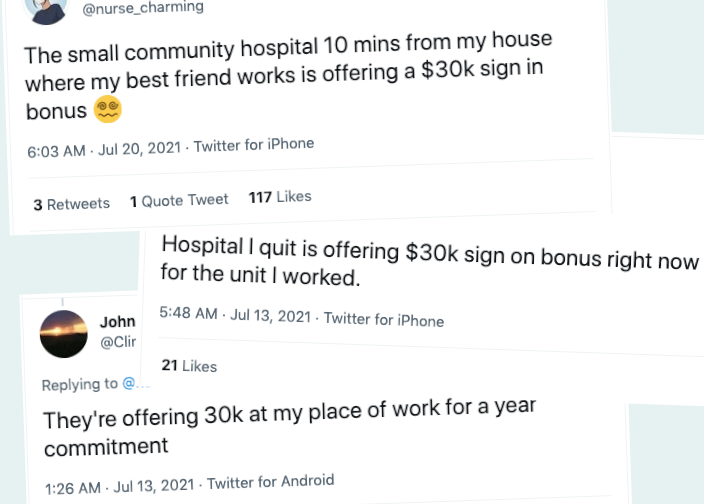

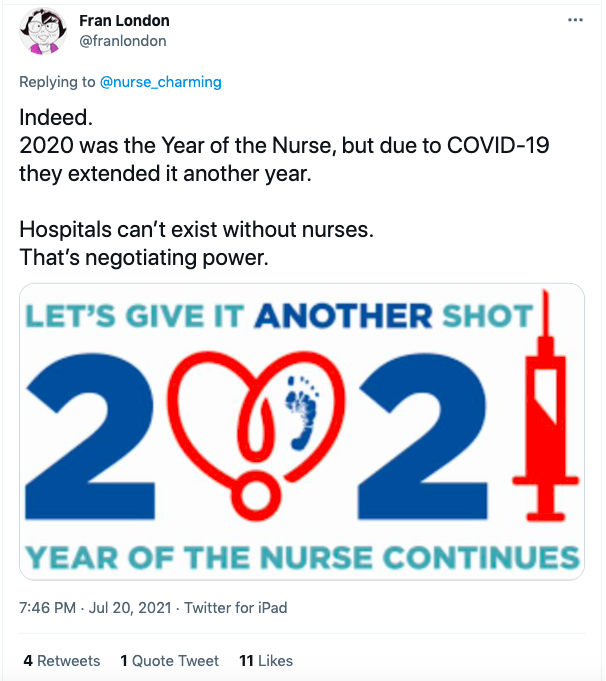
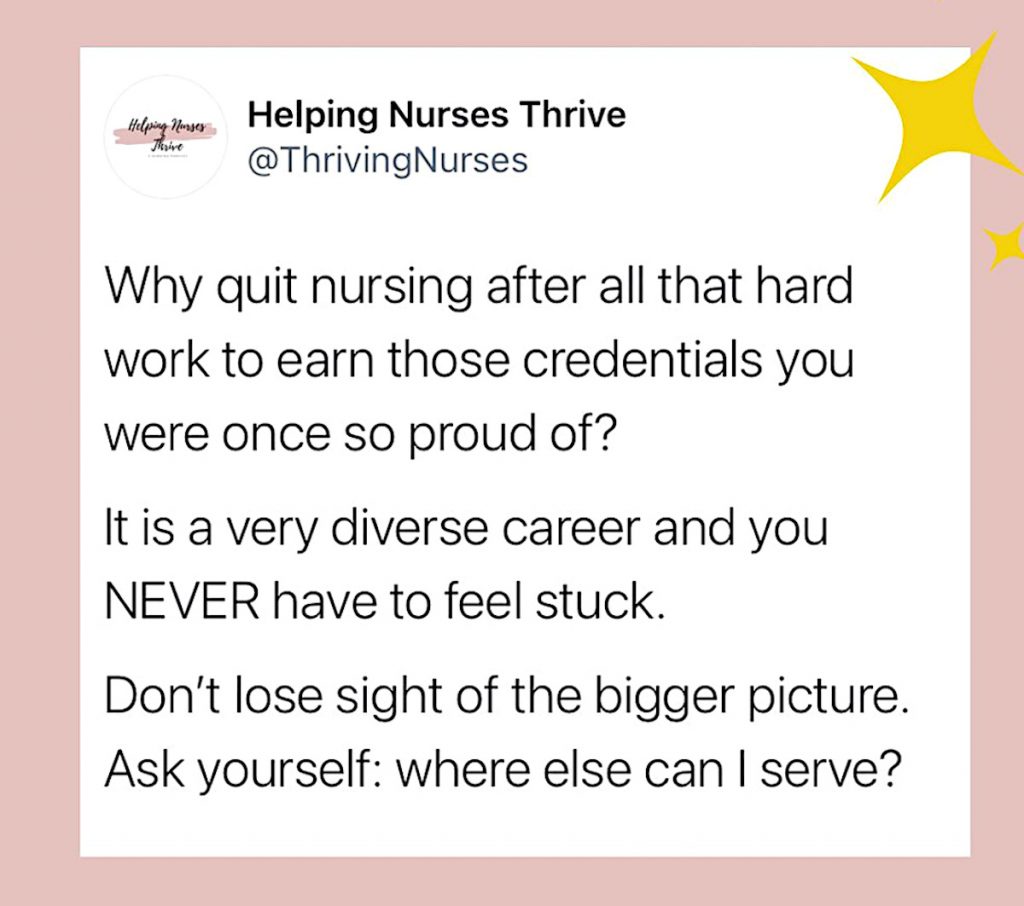
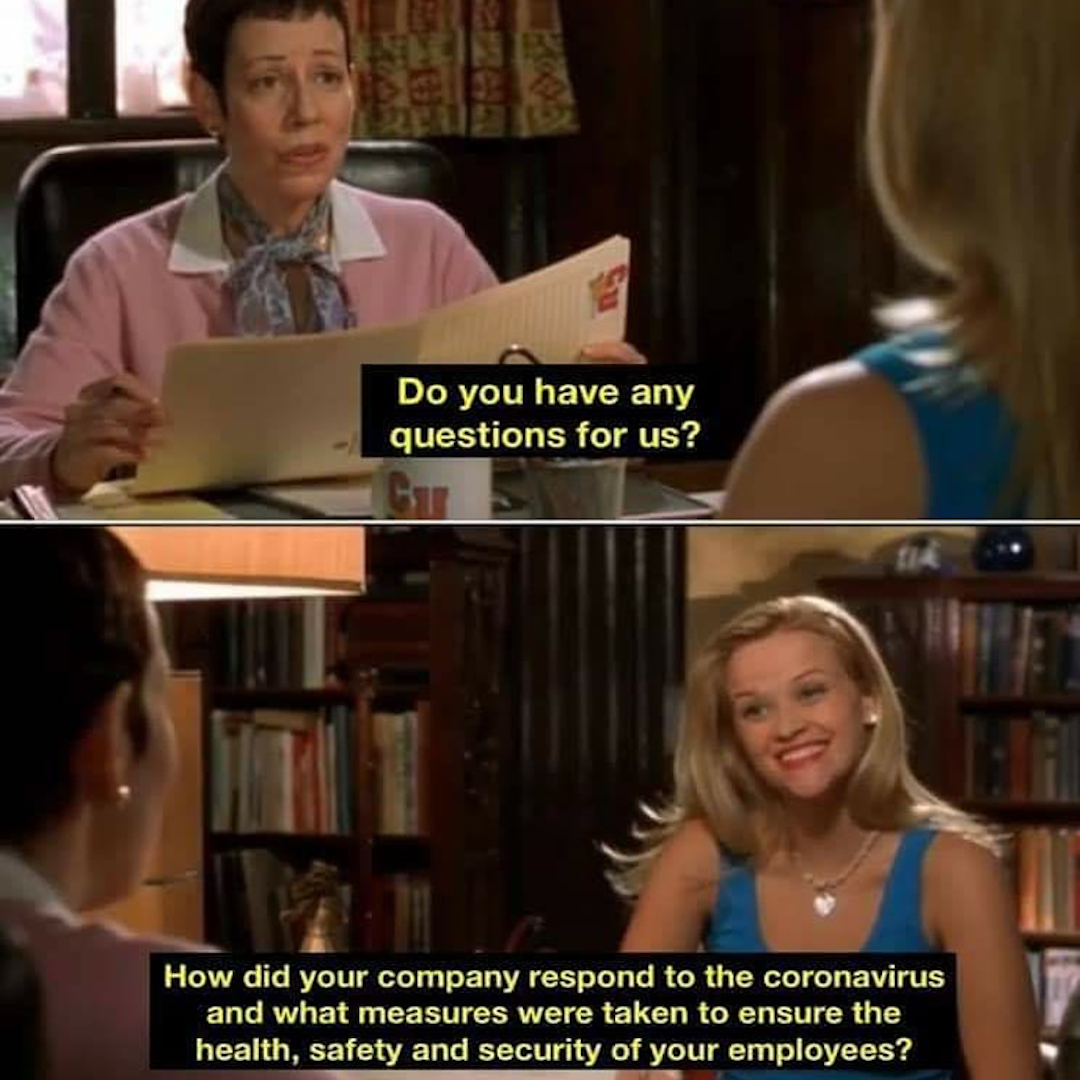
Sandra Henry
I live in Erie, Pa. There are several level nursing schools making the market a bit saturated…or so you would think. When I graduated with my BSN my first job was at a local rehab facility. My pay was under $13/hr. To this day the local hospital/nursing homes and so forth consider $28/hr. for a 25 yr. experienced Med/Surg BSN, RN. That is closer to starting rate for new grads in other places. So..they wonder why they can’t get nor retain good staff.
Leo (Lee) Nolet (I let my RN license expire 9/21)
September 29, 2021
10:27 am
Reply
As long as the salaries for Nurse Educators remain lower than a newly hired staff person in an acute care hospital, there will always be a shortage of these highly educated nursing instructors. And this, dear colleagues, results in the severe shortage of Registered Nurses that we are experiencing throughout the U.S. today! There are far more nursing applicants then there are nursing student slots, (both, Baccalaureate and Associate levels) due to the fact that there aren’t enough Nursing Instructors to teach additional students!
Salaries for Nurse Educators need to be increased dramatically so that it becomes a profession that qualified nurses aspire to and apply for.